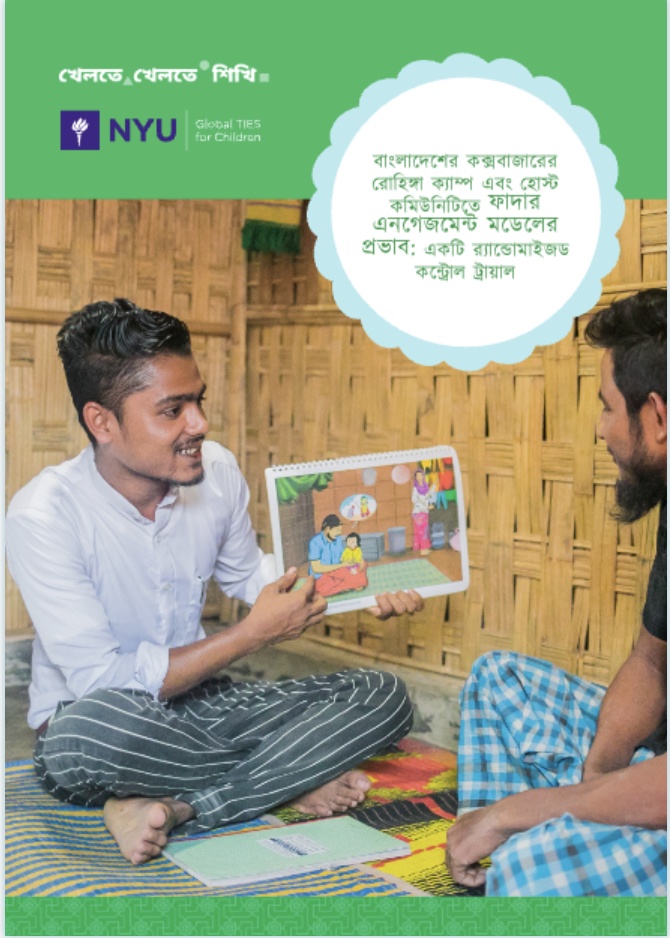Play to Learn Findings
Play is more than fun — it's essential for children’s development
Our research in Play to Learn and Ahlan Simsim emphasizes the different ways that play and playful learning can be important for early childhood development. Specifically in Play to Learn, we investigated 1) the potential of explicitly engaging fathers in their children’s development in Cox’s Bazar, Bangladesh and 2) the benefits of using multimedia content to support hard-to-reach Venezuelan migrant and Colombian children and caregivers in Barranquilla, Colombia.
Key takeaways and briefs that capture our findings are below.
-
The program had positive effects on several family dynamics known to improve child outcomes. These include:
Engagement of fathers with their wives
Parenting practices by fathers, including reduction in harsh discipline
Beliefs, held by fathers, about fathering, family engagement, and play
In interviews with fathers and mothers, both said that the program helped fathers to manage their anger and be less violent in the home.
This program had the greatest impact on families facing greater adversity.
These families showed higher levels of engagement in the program and greater improvements in parenting.
Unlike the rest of the sample, these families also showed positive effects on child vocabulary and fathers’ depression and anxiety symptoms.
The program had meaningful impacts in both Rohingya and host communities, but the effects are not identical across these two contexts. This suggests that, while effective, the program is likely to work differently for different communities, based on their particular needs.
Adding the fathers’ engagement program to the mothers’ program increased the per-household costs from $200 to $550 USD.
This program was well-received by the communities:
Engagement in this program was higher than usual for father-focused programs, with fathers attending, on average, 89% of sessions.
Both mothers and fathers wanted to see the program expand to more members of their community and run for a longer duration.
Extensive efforts to tailor this program to the specific needs of fathers resulted in several unique features that were critical to its success, including:
The overall program approach explicitly recognized that a replication of existing mothers’ programming would not be effective for fathers
The fathering and ECD curriculum was shaped by community-driven research and tailored to be culturally responsive
The program combined individual sessions for personalized support with group sessions to foster community interaction.
It was delivered by male volunteers with flexibility to accommodate fathers’ work schedules.
-
• Watching WPL supports the development of children’s foundational emotional skills. Specifically, it increased children’s ability to verbally identify emotions and recognize the emotions of others in social situations.
• There were no effects on math outcomes, as many participating children learned math at preschool. However, there are promising trends that suggest the videos supported math skills among those who were not attending any preschools or early childhood centers.
• The average cost of delivering WPL videos to participating families in the program was approximately 50 USD per family, with the majority of the cost attributed to the technology used in program delivery (39%) and the provision of internet top-ups to families (26%).
• Internet access and high data costs were reported to be significant barriers throughout the program. Around two-thirds of families requested internet support during the program, suggesting a need to embed internet and data provision into the program in some way or to give videos offline.
• Behavioral nudges or messages to motivate parents to watch the videos slightly boosted video viewing and should be experimented with in future implementations to increase their effectiveness.
• Caregivers who opened videos generally either stopped watching in the first 45 seconds or watched more than 7.5 minutes. This suggests that catching the family’s and child’s attention early may be critical to increasing exposure to and engagement with the content.
This study evaluates a 6-month early childhood development program for fathers of 0-3 year olds in the Rohingya camps and surrounding host communities in Cox’s Bazar District, Bangladesh. The program, part of the BRAC-led Humanitarian Play Lab initiative, focused on promoting fathers’ wellbeing, enhancing fathers’ relationships with their spouses and children, and fostering responsive caregiving practices. We used a cluster-randomized trial (CRT) (N=2,002) to examine impacts of the program on 1) Rohingya and host community fathers’ mental health, parenting, and engagement with the child and family and 2) their 0-3 year old children’s development.
বাংলাদেশের কক্সবাজার জেলার রোহিঙ্গা ক্যাম্প ও হোস্ট কমিউনিটির ০-৩ বছর বয়সী শিশুদের বাবাদের জন্য ৬ মাসের একটি প্রারম্ভিক শৈশব বিকাশ (আর্লি চাইল্ডহুড ডেভেলপমেন্ট-ইসিডি) বিষয়ক প্রোগ্রাম উন্নয়ন করা হয়েছিল। এই গবেষণাটি উক্ত প্রোগ্রামের প্রভাব মূল্যায়ন করেছে। এই প্রোগ্রামটি ব্র্যাক আইইডির নেতৃত্বে হিউম্যানিটারিয়ান প্লে-ল্যাব এর আওতায় উন্নয়ন করা হয়েছিল। এই প্রোগ্রামেটি বাবাদের মানসিক সুস্থ্যতা বা মানসিকভাবে ভালো থাকা, পরিবার, স্ত্রী ও শিশুদের সাথে সম্পর্ক উন্নয়ন এবং সংবেদনশীন লালন-পালনের অনুশীলনকে উৎসাহিত করার লক্ষ্যে পরিচালিত হয়েছে । এই গবেষণায় ক্লাস্টার-র্যান্ডোমাইজড-কন্ট্রোলড ট্রায়াল (আরসিটি)/(Cluster-Randomized-Controlled Trial -RCT) ব্যবহার করার মাধ্যমে (N=2002) ১)রোহিঙ্গা ও হোস্ট কমিউনিটির বাবাদের মানসিক স্বাস্থ্য, প্যারেন্টিং, এবং শিশু ও পরিবারের সাথে বাবাদের সম্পৃক্ততা (এনগেইজমেন্ট), এবং ২) ০-৩ বছর বয়সী শিশুদের বিকাশে প্রোগ্রামটির প্রভাব মূল্যায়ন করা হয়েছে।
This study is a causal impact evaluation of Watch, Play, Learn (WPL), a program by Sesame Workshop that consists of videos that aim to bring playful early learning opportunities to children, especially those affected by conflict and crisis, via mobile phones. This study focused on the effects of WPL math and social-emotional skills content delivered to Venezuelan migrants and Colombian children living in communities in Colombia where families and children face challenges in accessing essential services, including early education. Implementation was led by the Colombia office of Innovations for Poverty Action.
El presente estudio es una evaluación causal del impacto de Ve, Juega y Aprende (VJA), un programa por Sesame Workshop que consiste en vídeos que buscan ofrecer oportunidades de aprendizaje a través del juego a niños y niñas, especialmente aquellos afectados por conflictos y crisis, en los teléfonos móviles. Este estudio se centró en los efectos de los contenidos de VJA en matemáticas y habilidades socioemocionales presentados a niños y niñas colombianos y migrantes venezolanos que viven en comunidades de Colombia donde las familias y los niños se enfrentan a dificultades para acceder a servicios esenciales, incluida la educación inicial. La implementación fue liderada por la oficina de Colombia de Innovations for Poverty Action.
Play to Learn
Play to Learn is an innovative large-scale initiative from Global TIES for Children, the LEGO Foundation, Sesame Workshop, BRAC, and the International Rescue Committee that harnesses the power of play to deliver critical early learning opportunities to children and caregivers affected by conflict and crisis. Through Play to Learn, we work with our partners to evaluate early childhood development (ECD) programs in the Cox’s Bazar camps in Bangladesh with the Rohingya and in parts of Colombia with Venezuelan refugees. In addition, we are conducting a longitudinal prenatal birth cohort study with the Rohingya living in the Camps and neighboring host community members to understand the many factors that influence child outcomes.












